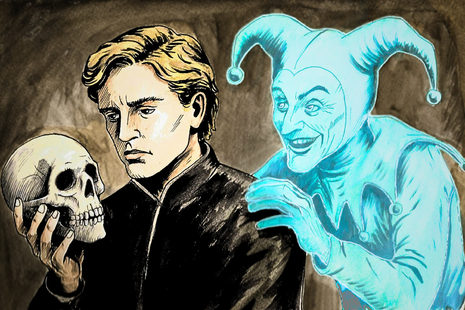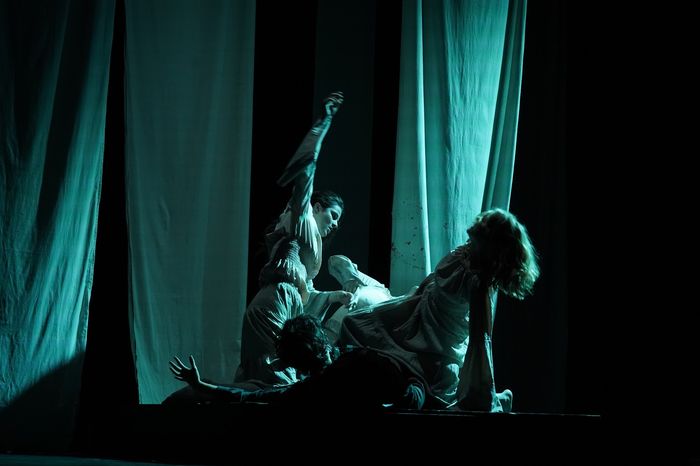Is your theatre haunted?
Kai Geere unravels the stage’s preoccupation with theatrical superstitions

One thing I can’t be excited about during my term abroad in Montpellier is watching a live performance of Shakespeare’s Hamlet at the stunning Opéra Comédie theatre. “Why?” you may ask. Well, rumour has it that this production is the consequence of a built-up superstition. One time the play was performed, the theatre went ablaze. Believing this to be a mere coincidence, the theatre put on another performance of Hamlet after restoration. Yet, the theatre was once again engulfed in flames. One of Shakespeare’s most renowned works has been blacklisted ever since. After hearing this, my mind drifted to the vast culture of superstition in theatre, which still leaves traces to this day. This includes the saying “Break a leg!” which lets actors and actresses wish each other luck, without incurring the negative jinx attached to the phrase “Good luck!” or the fear that saying Macbeth on stage may cast a curse akin to those of the three witches. Although an undeniable part of the fabric of theatrical tradition, are these superstitions worth preserving?
“The theatre was once again engulfed in flames”
As time flows, human knowledge and philosophy flows with it. Many of these theatrical superstitions were born at the same time as many myths and metaphysical ideas that science has now made look ridiculous. For some, referring to Macbeth as the Scottish play could be as ridiculous and redundant as a child’s fear of stepping on the cracks in a pavement. These superstitions could even be seen as destructive. For example, the Opéra Comédie may be losing out on ticket sales to other theatres in the region by refusing to show a production as well-known as Hamlet.
Yet the preservation of such traditions appeals to many performers and viewers alike, as they feel like they are participating in and adding to something exceptional and unique. To understand why, it is important to not interpret these superstitions as a principle that people hold as irrefutably true. For instance, there is a strong reason why, after restoring and taking ownership of the New Amsterdam Theatre in Manhattan, Disney actively promotes the superstition that former star Olive Thomas haunts it. The rich yet comfortable overlap between theatre and the spiritual realm seems a brilliant quirk to highlight, a unique angle to advertise the industry and to draw in the public. By holding onto the superstitions of Montpéllierains from the past, the Opéra Comédie continues to be what all theatres should be: a space where art is preserved and rich stories are told. If anything, the ‘Hamlet superstition’ allows this theatre to have a distinct character that separates it from theatres nearby. And in Manhattan, the idea of a ghost’s appearance is historic enough for spectators to experience the thrill of its possibility, however uncertain enough that they do not feel any sense of true danger.
“If anything, the ‘Hamlet superstition’ allows this theatre to have a distinct character”
With this being said, theatrical superstitions cannot even be ruled out as mere stories rooted in no evidence. Testimonies of incomprehensible magic and spiritual haunting can be found anywhere if you look, even within our own university. It is not uncommon to hear whispers of a curse circulate among cast members after their production suffers an intangible series of mishaps or injuries.
Within the Cambridge theatre community, students aspiring to enter the world of performance often discover that their connection to one another shapes the meaning of theatre itself. The existence and preservation of these superstitions can strengthen the connections between actors through the shared feeling of participating in a special experience, and the inside jokes that can be built on them. Thanks to the bonds and experiences shared by everyone involved, theatre at Cambridge becomes not only an artistic pursuit but also a collaboration rooted in camaraderie. It is this spirit of shared purpose and identity that allows theatre to thrive, ensuring its vitality for those who come after.
So, from the banks of the Cam to the Mediterranean Sea, it seems theatres and shows are portals to the other side. Shrilling testimonies of a spirit’s night out at the theatre form a rich part of theatrical history and heritage. The act of passing down this legacy is not only a perfect way to make people new to theatre feel like a part of a special community, but it strengthens the bonds between thespians that preserve the very essence of this community. A university like ours is precisely the most important place for these superstitions to be embraced because the future of theatre lies on the shoulders of our generation. If the centuries-old traditions and sense of camaraderie that make theatre what it is today are ignored, its roots will run no deeper than the surface of the stage.
 News / Right-wing billionaire Peter Thiel gives ‘antichrist’ lecture in Cambridge6 February 2026
News / Right-wing billionaire Peter Thiel gives ‘antichrist’ lecture in Cambridge6 February 2026 Features / From fresher to finalist: how have you evolved at Cambridge?10 February 2026
Features / From fresher to finalist: how have you evolved at Cambridge?10 February 2026 Film & TV / Remembering Rob Reiner 11 February 2026
Film & TV / Remembering Rob Reiner 11 February 2026 News / Churchill plans for new Archives Centre building10 February 2026
News / Churchill plans for new Archives Centre building10 February 2026 News / Epstein contacted Cambridge academics about research funding6 February 2026
News / Epstein contacted Cambridge academics about research funding6 February 2026










